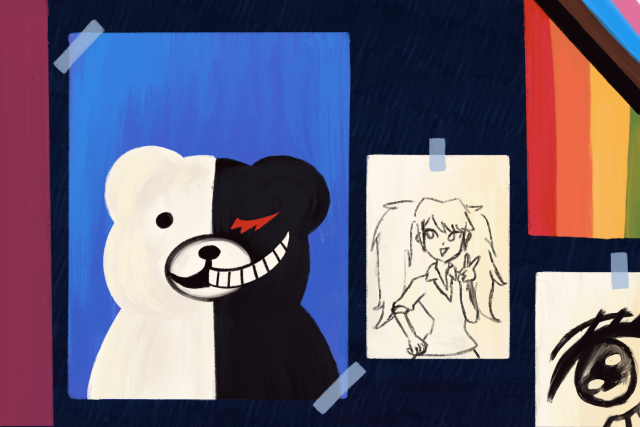[ad_1]
The year is 2017. I am 13 years old. My best friend has just recommended a new anime for me to watch. The trajectory of my life is about to change forever.
That night, hidden beneath the covers of my bed, I watched the first episode of the “Danganronpa” anime. I was instantly hooked. Based on a popular video game of the same name, the anime follows a group of 16 high school students forced into a killing game. The students are trapped inside a massive school, and the only way out is to murder another student … and get away with it. Each death is followed by a trial, in which the students must uncover the killer and send them to their execution. As the numbers dwindle, the stakes rise, and more school secrets are revealed. At the time, “Danganronpa” captivated me. The plot was simple, the cast vibrant and the mystery engaging. This was the first fandom of my teenage years.
Like me, many people spend their teenage years engaged in fandoms, or communities of fans, dedicated to a particular piece of media. From novels to anime, fandoms come in all shapes and sizes, providing a space for fans to engage with one another about their shared interests. When I became a “Danganronpa” fan, I started engaging with the fandom over the internet. I joined group chats through Instagram and Discord, all created with the sole purpose of discussing the media we loved.
In these chats, I felt seen in ways I had never experienced before. Here I was, talking with total strangers online, but somehow we were all connected through one common thread. It gave me a sense of belonging, something that I craved so deeply at the time. Fandom also provided me with a solid identity. If nothing else, I knew that I was a fan, and I knew some people would accept me for it.
Teenage years are often characterized by the struggle to find one’s identity. You’re suddenly bombarded with new freedoms and responsibilities and expected to navigate them without a clear destination. You don’t understand yourself, much less the world around you. Amidst the chaos, fandoms are solid, defined communities that can act as a lifeboat for someone struggling with their sense of self. Fandoms allow you to explore your interests however you desire.
There are infinite ways to participate in a fandom: Online forums, cosplay and fanart are just a few. Some people dedicate entire social media accounts to their fandoms. Some people code entire games based on their fandoms. “Five Nights at Freddy’s,” one of the most popular horror games of all time, has over a thousand fan games. Although these games are inspired by the “Five Nights at Freddy’s” franchise, whether narratively or mechanically, each game is its own creation and a highly impressive one at that. Fandoms provide spaces for creativity, in which fans are motivated by their love for a piece of media to pay it homage with their own unique creation.
Personally, I found joy in the literary side of fandom culture: fanfiction. Fanfiction is writing based on an existing piece of media, usually works of fiction. Maybe a fan wants to change the ending to their favorite show or send the characters on a beach vacation. All that and more is possible with fanfiction. Head to any fanfiction site, like Archive of Our Own or Wattpad, and you’ll find thousands of works for thousands of fandoms.
“Shipping,” or the desire for two characters to be in a romantic relationship, was an especially important part of my fandom experience. Growing up, I didn’t have much exposure to Queerness in media. I only realized that I was part of the LGBTQ+ community when I was 12, and it took me even longer to come to terms with my sexuality. When I first discovered fanfiction, I was overwhelmed by the vast number of stories centering Queer ships. I had struggled to find representation for so long, and suddenly it was right at my fingertips. Even if the media didn’t include any explicitly queer relationships or characters, it was comforting to find other fans creating their own narratives for characters I loved.
Although fandoms have many benefits for teenagers, they don’t come without faults. As the internet continues to expand its role in our lives, we must continue to emphasize safe engagement with the online world. Not all fan content is safe or appropriate, and teenagers being exposed to such content is far too common. In the past, fandoms have also been criticized for their exclusive nature. While fandoms may provide a sanctuary for some, they can quickly become toxic, feeding issues like cyberbullying. Depending on their level of involvement, being in a fandom can easily become a source of stress for teenagers.
But despite its drawbacks, fandom is still an important part of teenage life. What teenager doesn’t have at least one cringey obsession? For some, it’s “Harry Potter” and “Divergent,” for others, it’s “My Hero Academia” and “Dream SMP.” Making a TV show into your entire personality is not a crime. Fandom can be a very valuable way to make friends and establish a sense of identity at a pivotal point in your life. Even as we grow out of these obsessions, we continue to carry pieces of our fandoms with us into adulthood. I no longer dress up as “Danganronpa” characters for Halloween, but the friendships I formed during that phase of my life have molded me into the person I am today.
No teenager has it all figured out. I can laugh at my more embarrassing adolescent moments, but I’m truly grateful for the support that fandoms gave me during that time. We shouldn’t look back in horror at our old obsessions, but rather with appreciation and fondness for that kid still discovering themselves.
Daily Arts Writer Morgan Sieradski can be reached at kmsier@umich.edu.
Related articles
[ad_2]
Source link











